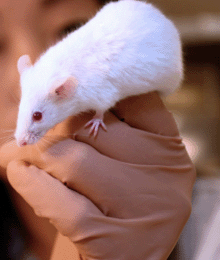Research Matters
August 25, 2008 Vitamin C Injections Reduce Growth of Mouse TumorsA new study has found that daily high-dose injections of vitamin C significantly reduce tumor growth in mice.  Daily high-dose injections of vitamin C significantly
reduce tumor growth in mice.
Vitamin C—otherwise known as ascorbate— is an important nutrient that’s used throughout the body. Deficiency can result in a condition called scurvy that can ultimately result in death if left untreated. Vitamin C also acts as an antioxidant, removing unstable oxygen molecules left over from chemical reactions that can damage cells. Several studies dating back 30 years ago had observed that vitamin C had potential anti-cancer properties when given to patients in high doses orally and through injections. A few years later, however, when patients with advanced cancers were treated with oral vitamin C in clinical trials, the vitamin did not have an anti-cancer effect. Researchers from NIH’s National Institute of Diabetes and Digestive and Kidney Diseases (NIDDK), National Cancer Institute (NCI) and the University of Kansas Medical Center decided to reexamine vitamin C as a potential cancer therapy. First they tested high doses of ascorbate on 43 different tumor lines and 5 normal cell lines. In the August 12, 2008, issue of Proceedings of the National Academy of Sciences, the researchers reported that high concentrations of vitamin C caused cell death in 75% of the 43 cancer cell lines they tested, but didn’t affect the normal cell lines. When high-dose ascorbate injections were given once or twice daily to mice with aggressive brain, ovarian or pancreatic cancers, the tumors shrank by up to 53%. In mice with aggressive brain tumors, the injections prevented cancer cells from spreading to other parts of the body. Vitamin C is best known as an antioxidant, but when it is injected at high doses, it promotes formation of prooxidant, destructive hydrogen peroxide molecules. The researchers tested catalase, an enzyme that breaks down hydrogen peroxide into water and oxygen, and found that it neutralized the effect of ascorbate on the tumor cell lines. Mice examined after injections of ascorbate had high levels of hydrogen peroxide in the spaces surrounding tumor cells, supporting the idea that hydrogen peroxide is the cause of tumor cell death. Previous clinical trials using vitamin C were unsuccessful, explained lead researcher Dr. Mark Levine, because when taken orally vitamin C levels are tightly controlled by your body. “When you eat foods containing more than 200 milligrams of vitamin C a day—for example, 2 oranges and a serving of broccoli—your body prevents blood levels of ascorbate from exceeding a narrow range,” he said. Researchers didn’t realize at the time that only injected ascorbate could raise tissue levels enough to harm tumor cells. The researchers tested escalating doses of intravenous ascorbate in people and found that they could reach blood plasma concentrations similar to those they’ve achieved in mice. Clinical trials are now in the planning stage to test injected ascorbate as a potential cancer treatment. Related Links:This week's NIH Research Matters Immune Cells Help Tropical Parasites Evade Death Protein Plays Role in Preventing Autoimmunity Vitamin C Injections Reduce Growth of Mouse Tumors This page was last updated
August 26, 2008
.
|



